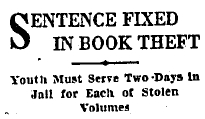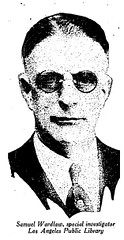
February 4, 1927
Los Angeles
A police dragnet is closing in on the killers of Luther H. Green. A member of the Los Angeles Stock Exchange, Green was slain outside of his home at 1053 Bonnie Brae, as he attempted to thwart the hijacking of his $10,000 [$120,710.34 current dollars] stash of pre-prohibition booze. He was able to fire a single shot from his rifle before being mortally wounded by the burglers.
According to Chief of Detectives Cline, six men have been implicated in the aborted liquor heist. It is believed that the ringleader of the failed raid may be the notorious crook, Harry “Mile-Away” Thomas. Mile-Away’s mouthpiece, Attorney S.S. Hahn, told cops that he had conferred with his client and, “…he was not only a mile away this time, but sixteen miles away”. Harry and several of his confederates would soon be arrested in connection with Green’s murder, but none of them would ever stand trial for the crime.
More than a decade prior to the invention of Teflon ®, the often busted but rarely convicted non-stick felon would be released on the charges stemming from the Green killing. His lucky streak would end on the evening of April 21, 1927. Harry would be caught in a sting and gunned down by the law as he attempted to steal an expensive automobile from a private garage at 1408 West Thirty-Fifth Street.
Riddled with machine-gun bullets, buckshot, and slugs from police revolvers, Harry staggered from the garage and collapsed in the arms of a uniformed officer. Mile-Away’s last words before he succumbed to his injuries were “Everybody has to fall some time.”


 February 3, 1927
February 3, 1927 But fret not people of Los Angeles! The bulls have pinched (
But fret not people of Los Angeles! The bulls have pinched (






 Xanders spent most of the day with sheriffs, trading quips and calmly confessing to a litany of misdeeds. He admitted to burglarizing the home of John Lindley near Azusa (see photo), and he has also said that he and his crime buddy, Ray E. McCoy, robbed famed boxing manager
Xanders spent most of the day with sheriffs, trading quips and calmly confessing to a litany of misdeeds. He admitted to burglarizing the home of John Lindley near Azusa (see photo), and he has also said that he and his crime buddy, Ray E. McCoy, robbed famed boxing manager 



 Mr. and Mrs. Jack Laughlin of 2115 S. Harvard departed for a weekend getaway in San Diego, leaving their daughter, June Blossom, 14, in the care of their housekeeper and family friends. After saying goodbye to her folks, June invited her friend Mary Jane Carroll, 13, over for the weekend.
Mr. and Mrs. Jack Laughlin of 2115 S. Harvard departed for a weekend getaway in San Diego, leaving their daughter, June Blossom, 14, in the care of their housekeeper and family friends. After saying goodbye to her folks, June invited her friend Mary Jane Carroll, 13, over for the weekend.




 November 24, 1927
November 24, 1927 In further news of the Boys in Blue, another Damn’d Yankee, this one in Spokane, has problems of another variety. “I’m living on borrowed time,” said Enoch A. Sears, 84, “far past my allotted three score and ten, and I only want peace and quiet.” He has filed for divorce from his wife of one year, and has departed his home, leaving it to his wife, 59, and her mother, 79. Enoch simply stated he was “too old to become accustomed to living with a mother-in-law.”
In further news of the Boys in Blue, another Damn’d Yankee, this one in Spokane, has problems of another variety. “I’m living on borrowed time,” said Enoch A. Sears, 84, “far past my allotted three score and ten, and I only want peace and quiet.” He has filed for divorce from his wife of one year, and has departed his home, leaving it to his wife, 59, and her mother, 79. Enoch simply stated he was “too old to become accustomed to living with a mother-in-law.”
 These days, if you make off with a stack of library materials, the Los Angeles Public Library will report your thieving name to a collections agency. But library bandits of yesteryear like 20-year-old Clyde M. Thompson faced much stiffer penalties.
These days, if you make off with a stack of library materials, the Los Angeles Public Library will report your thieving name to a collections agency. But library bandits of yesteryear like 20-year-old Clyde M. Thompson faced much stiffer penalties.
 During the 1920s, the Los Angeles Public Library employed detectives to investigate thefts and mutilation of library material. A 1929 Times article featured the efforts of Special Investigator Samuel Wardlaw, a man as hardcore as he was humorless.
During the 1920s, the Los Angeles Public Library employed detectives to investigate thefts and mutilation of library material. A 1929 Times article featured the efforts of Special Investigator Samuel Wardlaw, a man as hardcore as he was humorless.